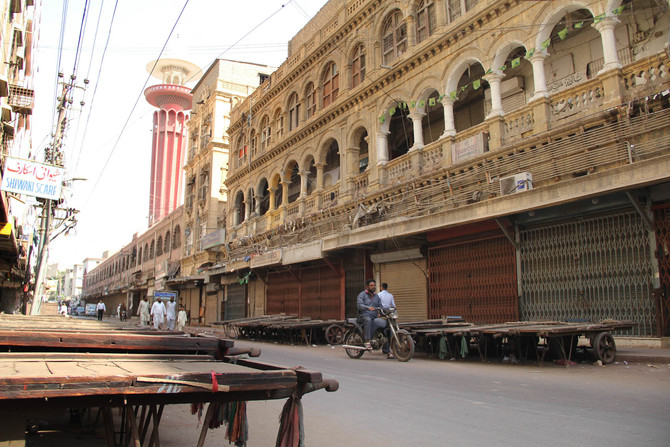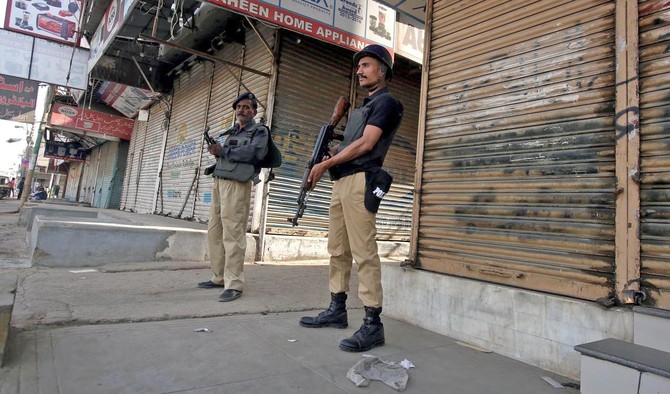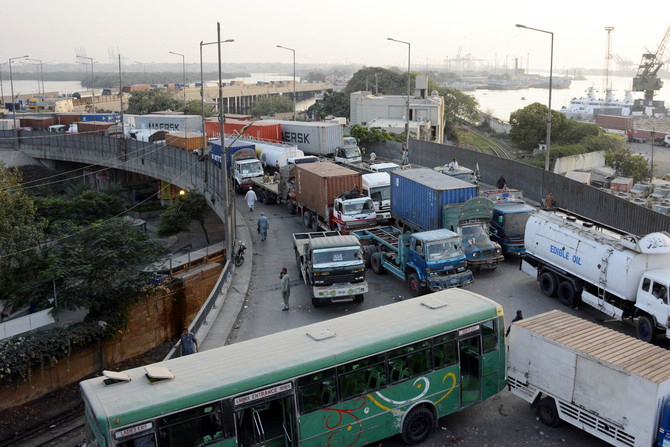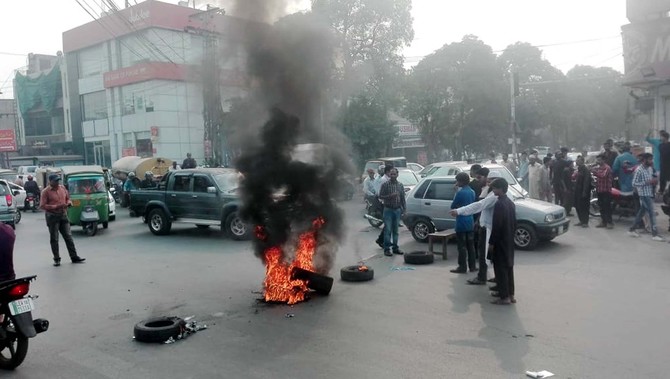KARACHI: Pakistan’s economy suffered a loss of Rs100 to Rs120 billion following the three-day countrywide protests called by religious parties rallying against the Supreme Court’s decision to acquit a Christian woman accused of blasphemy, traders and industrialists told Arab News on Saturday.
Life limped back to normalcy after an agreement was signed between the leaders of the Tehreek-i-Labbaik Pakistan (TLP), a far-right political party, and the government ending 72 hours of violent demonstrations that had paralyzed business activities across the country.
“The country’s daily business activities are worth Rs30-40 billion, which means it lost that much amount everyday during the protests which paralyzed industrial activities for three days,” Muhammad Danish Khan, President of Korangi Association of Trade and Industry (KATI), which represents one of the largest industrial estates of Pakistan, told Arab News.
He added that Korangi industrial, which was forced to cease its activities for the past few days on account of the nationwide protests, is host to nearly 4,000 small and large industries, including a refinery, and contributes Rs400 million every day to the national exchequer.
Highlighting the impact of the ill-timed protests, especially with Prime Minister Imran Khan visiting China to secure financial assistance and investment, Syed Mazhar Ali Nasir, Senior Vice-President, Federation of Pakistan Chambers of Commerce and Industry (FPCCI), said: “The cost of the country’s image and the exports is much higher from the economic numbers, especially at a time when the country’s prime minister is in another country to secure financial assistance and investment.”
Though no official figures detailing the actual loss to the economy have been released, industrialists and traders estimate it to be in billions, with the port city of Karachi impacted the worst, sending disturbing signals to the rest of the country about its economic health.
“Nearly 85 to 92 percent of cross border trade, particularly exports of Pakistan, are transshipped from Karachi. Approximately Rs7 billion of exports are lost during a one-day strike in Karachi. Similarly Rs17 billion worth of imports are disturbed due to this reason,” the FPCCI said.
As the industrial activities came to a grinding halt three days ago, the trading community also suffered losses due to a lack of sales. “We estimated that during the last three days our trading community has suffered around Rs100 billion losses. Small shopkeepers were mostly impacted by the events,” Khalid Pervaiz, President of All Pakistan Traders’ Association, said, while Atiq Mir, Chairman of Karachi Tajir Itehad, added that traders “incurred losses worth Rs15 billion in Karachi alone”.
“More than three million daily wagers turn up every day in the markets to earn their livelihood, with means of their livelihood blocked by this kind of protests,” Mir said.
Pakistan’s Karachi Port Trust (KPT) handles an average of 80,000 tons of cargo per day. “The shipping activities at the harbor during the protests remained normal but due to the non-availability of transport, movement of export and import goods remained suspended,” Shariq Amin, spokesman of KPT, said.
Pakistan’s industrialists and traders called for a comprehensive policy to tackle sensitive issues and violent protests. “Businessmen are the first victims of such violent actions. In such conditions who will place order from outside of Pakistan,” Nasir questioned.
“It is the responsibility of the state to stop violence and protect the life and properties of citizens,” Pervaiz said, adding that the government should take the business community into confidence and consult with them “because it’s the economy which guarantees the security and existence of the state”.
“All sensitive issues concerning politics and religion must be resolved at the table rather than on streets,” Nasir said, reasoning that negotiations should be the first and violence could be the last option. “Unfortunately in Pakistan, the last option is exercised in the first place,” he added.0
Businessmen pay Rs120bn as price for three-day protests
Businessmen pay Rs120bn as price for three-day protests

- Pakistan’s industries and markets remained shut following protests against SC verdict
- Country generates nearly Rs30-40bn revenue every day, traders say
Pakistan Senate committee approves bill to establish commission for minority rights

- Constitution guarantees equal rights and protection for all citizens, including religious minorities but disparities in practice persist
- Minorities face persistent challenges in accessing public services and participating fully in social and economic life
ISLAMABAD: The Pakistani Senate Subcommittee on Human Rights on Thursday approved a bill to establish a commission on minority rights in accordance with the United Nations and international standards and regulations, a statement from the committee said on Thursday.
The Pakistani constitution guarantees equal rights and protection for all citizens, including religious minorities, but disparities in practice persist. While the constitution protects freedom of religion and prohibits discrimination based on religion, minorities face persistent challenges in accessing public services and participating fully in social and economic life. There is also widespread persecution of minority groups.
On Thursday, the minister of law briefed the Senate committee on the National Commission for Minorities, which will constitute eight members, four from the government and four representing the parliament.
“There will be Parliamentary Committee consisting of four members: which will be nominated by the Speaker National Assembly, two from the treasury and two from the opposition benches,” according to a statement from the Senate.
“Besides this, two minority members from each province, who are Pakistani citizens not younger than 35 years of age and possessing considerable knowledge and practical experience in Human Rights advocacy, will be included in the commission.”
The statement said the recommended timelines for the process were a maximum of 45 to 60 days. The commission would hold the power to direct other local human rights institutions to take up matters in their own ambit of expertise.
The committee reached consensus on two key points.
“First, the nomination for the National Commission for Minorities will be shortlisted within 30 days, and the Constitution of Commission will be completed within 45 days,” the statement said. “Secondly, the minimum age for nominated members will be 35 years.”
According to a copy of the bill widely reported by local media, the commission will “assess and monitor [the] implementation of the constitutional guarantees and safeguard for promotion and protection of rights of minorities.”
The commission will also review existing or proposed policies or programs to prevent discrimination and protect minorities and provide recommendations to the relevant departments.
23,620 Pakistani pilgrims to perform Hajj under private scheme this year — ministry

- Pakistan was given a quota of 179,210 for the pilgrimage this year
- Nearly 90,000 Pakistanis to perform Hajj 2025 under government scheme
ISLAMABAD: The ministry of religious affairs said on Tuesday only 23,620 Pakistani pilgrims would be performing Hajj under the private scheme this year.
The annual Islamic pilgrimage is expected to take place this year in June. Pakistan and Saudi Arabia signed the Hajj Agreement 2025 in January, under which Pakistan was given a quota of 179,210 for the pilgrimage this year. The quota is divided equally between government and private schemes.
Nearly 90,000 Pakistanis are expected to travel to Saudi Arabia under the government scheme this year.
“General public is hereby informed that only 23,620 pilgrims will be able to perform Hajj under the Private Hajj Scheme from Pakistan this year 2025,” the religious affairs ministry said in a statement.
“The list of service providers providing services with the Hajj 2025 quota has been updated on the website of the Ministry of Religious Affairs and Interfaith Harmony and the Pak Hajj App.”
The ministry urged pilgrims who had made bookings with registered service providers to check the status of their application and contract on the ministry’s website.
“All organizing/service provider companies are directed to provide updated contract (Hajj Form) to Hajj pilgrims as per the approved quota of Hajj 2025 and ensure the process of issuing Hajj visas to pilgrims by April 18 as per the instructions of the Ministry of Hajj and Umrah, Kingdom of Saudi Arabia,” the ministry added.
Hajj flight operations will begin from Apr. 29 when the first flight will depart from Pakistan’s eastern city of Lahore.
Prime Minister Shehbaz Sharif has constituted a three-member inquiry committee to probe why Pakistan had failed to use the whole 179,210 quota for Hajj 2025.
Soldier, four militants killed in armed operation in northwest Pakistan

- Military has launched frequent operations in Khyber Pakhtunkhwa province bordering Afghanistan in recent years
- Pakistan says militants launch attacks using safe havens in Afghanistan, a charge Kabul denies
ISLAMABAD: A sepoy was killed in an intelligence-based operation in the northwest of Pakistan, the military said on Thursday, as it battles a spike in militant attacks.
In recent months, the military has launched frequent operations in the restive Khyber Pakhtunkhwa province bordering Afghanistan. The army’s target in the area are militants it says launch attacks inside Pakistan and against the army using safe havens in Afghanistan. The Taliban government in Kabul says it does not allow its territory to be used by insurgents against other countries.
Groups like the Pakistani Taliban, commonly known as Tehreek-e-Taliban Pakistan (TTP), have been waging a war against the Pakistani state for nearly two decades in a bid to overthrow the government and replace it with what they consider an Islamic system of governance.
In the latest operation, the army’s media wing said security forces had conducted an intelligence-based operation in general area Maddi in the Dera Ismail Khan district on Apr. 16, killing four militants.
“However, during intense fire exchange, one brave son of soil, Sepoy Basit Siddique (age: 23 years, resident of District Attock), having fought gallantly, paid the ultimate sacrifice and embraced shahadat [martyrdom],” the army’s statement said.
Militants have intensified their attacks since revoking a ceasefire with the government in late 2022, with recent months witnessing significant strikes targeting the military and its bases.
Pakistan to seek bids to sell national airline next week

- Privatization board approves pre-qualification criteria for selection of prospective bidders
- New expressions of interest in buying between 51-100 percent of airline would be sought next week
ISLAMABAD: The Pakistani government will seek expressions of interest next week for the sale of Pakistan International Airlines, the privatization ministry said on Thursday, days after it reported its first annual profit in over two decades.
Pakistan has been seeking to sell a 51-100 percent stake in the debt-ridden carrier, to raise funds and reform cash-draining, state-owned enterprises as envisaged under a $7 billion International Monetary Fund program.
Its failed attempt to privatise Pakistan International Airlines last year received a single offer, well below the asking price of more than $300 million.
The privatization commission board has approved seeking new bids, the ministry said in a statement.
“The board approved the pre-qualification criteria for selection of prospective bidders,” it said. It added new expressions of interest in buying between 51 and 100 percent of the airline would be sought next week.
Pakistan has shifted almost all of the national carrier’s legacy debt to government books after issues raised by bidders led to the failure of the last privatization attempt.
Muhammad Ali, government adviser on privatization, said last week all the issues raised at the time of last year’s failed attempt had been dealt with.
Pakistan’s top diplomat meets Bangladesh’s Yunus as first foreign office meetings in 15 years held

- Interactions in Dhaka come amid political shifts in Bangladesh following the ouster of pro-India PM Sheikh Hasina Wajid in student uprising
- While Hasina’s removal from office was followed by cooling of relations between Dhaka and New Delhi, exchanges with Islamabad are growing
ISLAMABAD: Pakistani Foreign Secretary Amna Baloch met Chief Adviser of Bangladesh Muhammad Yunus on Thursday to discuss trade, investment, youth linkages and regional integration, following the first Foreign Office Consultations (FOC) between the two nations in 15 years.
The two countries, which were once one, have shared a tumultuous history, with Bangladesh gaining independence from Pakistan in 1971 after a bloody war of independence.
The latest meetings in Dhaka come amid significant political shifts in Bangladesh following the ouster of Prime Minister Sheikh Hasina Wajid in a popular student uprising last year. Hasina’s government was hostile toward Pakistan but closely allied with India, where she remains exiled. While her removal from office was followed by the cooling of relations between Dhaka and New Delhi, exchanges with Islamabad have started to grow.
“During the Foreign Secretary’s call on the Chief Adviser, Yunus, inter alia, trade and investment opportunities, youth linkages, regional integration, and revival of SAARC [South Asian Association for Regional Cooperation] remained the focus of discussion,” Pakistan’s foreign office said in a statement.

A separate statement from Yunus’ office said he “put the emphasis on strengthening ties with Pakistan to boost mutual cooperation and explore trade and business potentials.”
“There are certain hurdles. We have to find ways to overcome those and move forward,” the chief adviser told Baloch who was in Dhaka for the 6th round of Foreign Secretary Level Consultations (FSLC).
A 7th round will take place in Islamabad in 2026. The consultations are expected to pave the way for a visit by Pakistan’s Deputy Prime Minister and Foreign Minister Ishaq Dar to Bangladesh at the end of the month, the first such visit by a Pakistani foreign minister since 2012.
The chief adviser said that Bangladesh and Pakistan should exchange more youth and cultural programs to increase people-to-people bonding.
“We kept missing each other for a long time as our relationship was frozen. We have to overcome the barriers,” he said.
“WE CAN’T MISS THE BUS EVERY TIME”
The statement from Bangladesh quoted Pakistani Foreign Secretary Baloch as saying ways must be found to “harness the potentials between the two countries.”
“We have huge intra-regional markets on our own rights. We should use it,” Baloch said. ” “We can’t miss the bus every time.”
She said that there was a need for regular B2B (business to business) interactions between the private sectors of the two countries and the exchange of visits at all levels.
“Both sides had a constructive and forward-looking engagement in a cordial environment where entire spectrum of Pakistan -Bangladesh bilateral relations came under discussion, including political, economic and trade relations, cooperation in agriculture, environment and education, cultural exchanges, defense relations and people to people contacts,” the Pakistani foreign office added.
“The focus of talks on economic cooperation and people to people relations is a realistic and pragmatic agenda for the revival of ties,” Former Pakistani diplomat Ali Sarwar Naqvi, an executive director of the Center for International Strategic Studies in Islamabad, told Arab News, commenting on the latest interactions in Dhaka.

In regional terms, Naqvi said growing ties between Islamabad and Dhaka were a “setback” to India’s hegemonic ambitions in South Asia.
Former Foreign Secretary Aizaz Ahmad Chaudhry said the people of Pakistan and Bangladesh were bound by history, faith and culture, and it was encouraging to see their bilateral ties on an “upward trajectory.”
“It was unfortunate that during Sheikh Haseena’s time, all these relations and relations were cut off, but now that the change has come, the situation has improved,” he told Arab News, saying any differences in the future should be resolved through “diplomacy and dialogue.”
“The cooperation between Pakistan and Bangladesh is not aimed against any third country, and India should see it as a natural interaction between two sovereign nations,” he added.
Another former ambassador, Masood Khalid, said Pakistan and Bangladesh were once one country and it was “illogical and unnatural” for them not to have diplomatic contact for decades.
“Both countries deciding to explore cooperation in multiple fields and restore their historical bonding finds resonance among the people of two countries,” he told Arab News.
“I am confident that this headway in bilateral ties will be of mutual benefit and conducive to regional peace and stability.”














